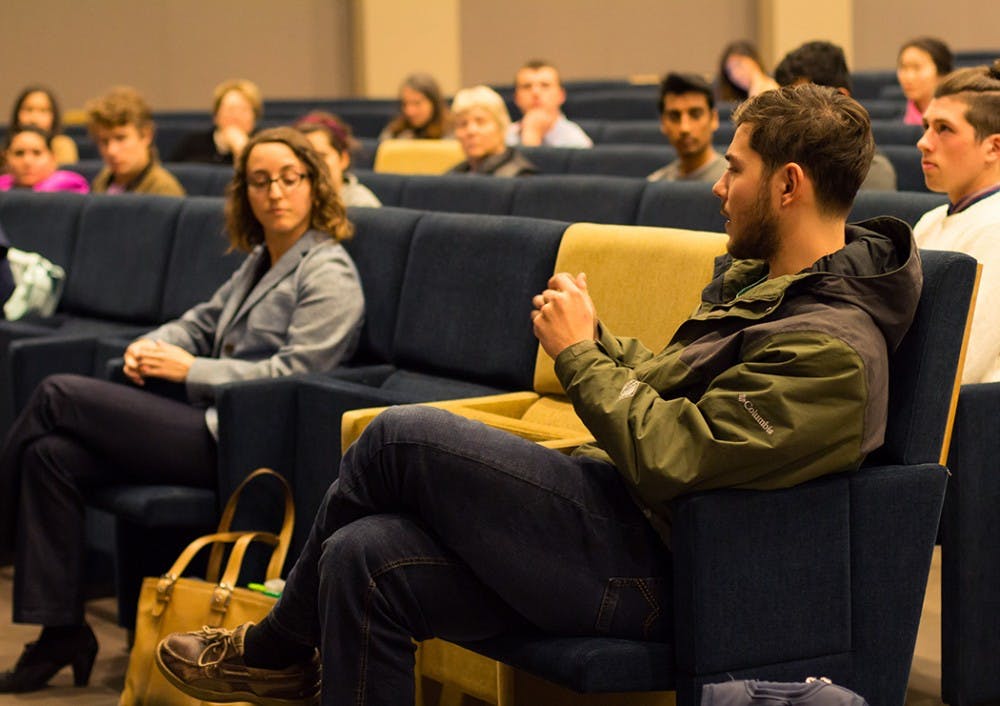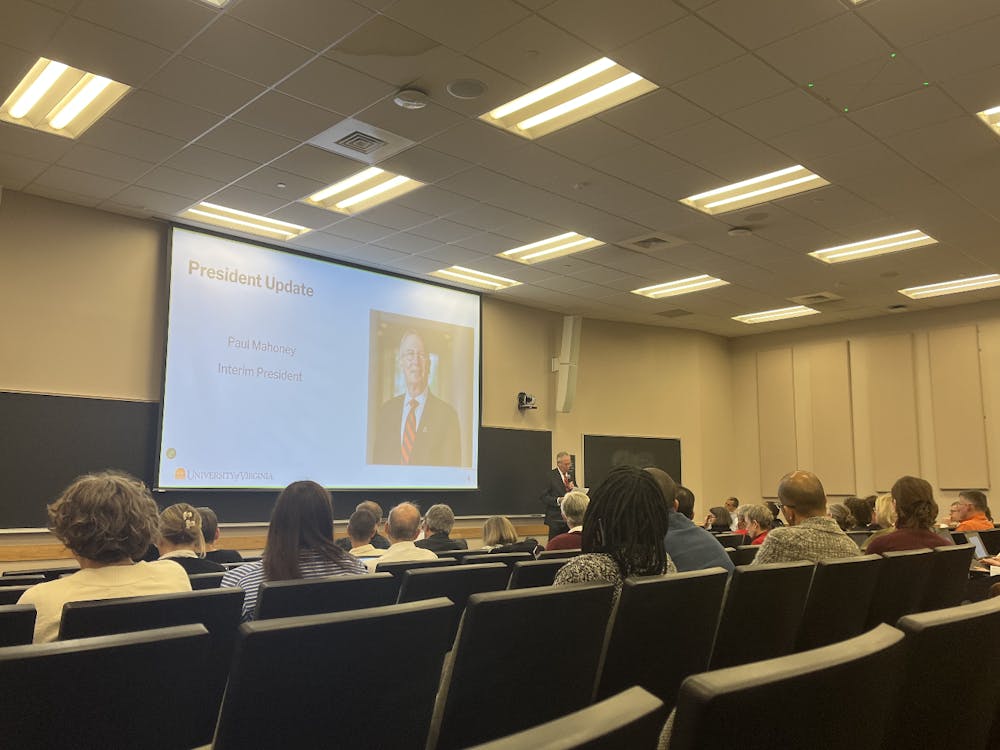The Minority Rights Coalition hosted a town hall on Diversity, Equity & Inclusion Friday — a follow-up to this semester’s spike in reported bias-related incidents and the Eliminate the Hate campaign.
Drawing a crowd of about 65 people to Newcomb Theater, the town hall opened with a presentation that broke the day’s topic into four main areas — academics, leadership, institution and culture.
MRC Chair Attiya Latif, a third-year College student, led the crowd through a history of diversity issues at the University, from its founding to incidents such as the reported assault of Daisy Lundy, Martese Johnson’s arrest and this year’s spike in reported hateful speech and graffiti.
“These incidents don’t occur in a vacuum, so we wanted to kick this event off in perspective,” Latif said at the event. “We wanted to share some statistics with you and start with a brief history lesson of the University.”
Latif and other MRC members presented a series of slides featuring statistics that broke down items such as GPA, admissions and mean SAT scores by gender and race.
The Student Experience in the Research University Survey was presented as an indicator of campus climate, and its results were also broken-down by race.
While the SERU data does not account for safety and inclusion concerns of LGBTQ students, religious minorities or other racial minorities who may be facing feelings of unsafety on Grounds, Latif said, the data showed that black students rate the University significantly lower than all other groups on all climate dimensions.
“Black students distinctly feel that U.Va. is a hostile campus, it’s impersonal, it’s not appreciative of diversity and it’s dangerous, it’s not intellectually stimulating and it’s a little too hard,” Latif said.
They also discussed a report recently released by the Office of the Dean of Students on the number of bias-related incidents from fall 2015 to summer 2016, as well as the first four months of this academic year.
Last academic year, a total of 14 incidents were reported using the University’s anonymous “Just Report It” system as bias-related, while 44 such incidents have been reported since August of this year.
The University defines a bias-related incident as “any report of a threat or act of harassment or intimidation — verbal, written or physical — which is personally directed against or targets a University of Virginia student because of that student’s age, color, disability, marital status, national or ethnic origin, political affiliation, race, religion, sex (including pregnancy), sexual orientation, veteran status or family medical or genetic information.”
Just three of last years’ reported incidents were found to comply with this definition, compared to 16 of this years’ reports, according to the Office of the Dean of Students.
Following the presentation, the assembly broke up for two rounds of small, group discussions on what resources and organizations related to diversity, equity and inclusion already exist at the University, and how these could be improved. This included topics such as faculty diversity, housing and residence life, bias-related incidents, workers at the University and DACA and undocumented students.
One goal of the town hall was to empower students to engage in substantive discussions with University administrators, MRC President of Outreach Araba Dennis, a third-year College student, said.
“Student self-governance is actually a thing, we can actually have forums with administrators and people that are creating policy and say, ‘This is what we need from you as administrators,’” Dennis said.
One of the break-out groups featured a panel of administrators from the Office of African American Affairs, Multicultural Student Services, the Women’s Center, the Black Cultural Center and the LGBTQ center, as well as Dean of Students Allen Groves.
Each representative shared a variety of initiatives and resources that their organization provides to students, from social justice advocacy to classes in peer counseling, but a common theme was the importance of students’ physical and mental well-being and how intimately those things are tied to academic success.
“I think it’s a strong-suit of OAAA in that we’re constantly using academic performance as a diagnostic criteria for many things, whether it's social, relational, emotional,” Michael Mason, BCC director and assistant dean of the OAAA, said. “We’re definitely trying to keep our fingers to that pulse.”
When asked what services they would provide to a student in the aftermath of a hate or bias-driven incident, Groves said his office could aid the student in a variety of ways, including counseling referrals, personal safety plans, addressing housing concerns and — if appropriate — securing protective orders and facilitating police reports.
“I think that when you look at the range of things we deal with every day, we try to listen to the student,” Groves said. “We try to advocate for and protect the student and make them aware of what things might be out there and available.”
Groves said he encourages students to share what resources have worked for them as the best way to spread awareness of University resources related to diversity, equity and inclusion.
“My hope is, is that students who have a positive experience with any of these resource areas that we’re talking about, that they will say to their peers, ‘You know, I had a really great experience,’” he said.
Each break-out group will meet again over the course of the next semester as a working group for some facet of University policy change, Latif said.
“We will have working groups for every one of the topics that wishes to have one, with any student that wishes to volunteer and be a part of it, and those groups will meet regularly,” she said. “Whatever they construct or create will be an implementable change.”
After the event, Latif said she was happy with the turnout and the course discussions had taken that day.
“We’ve gotten a really productive outlet for a lot of the things we’ve been thinking about, and we’ve had people to bounce ideas off of,” she said. “We’ve sort of realized that there are productive ways to go about moving forward from here, and we don’t have to stagnate in one place.”







